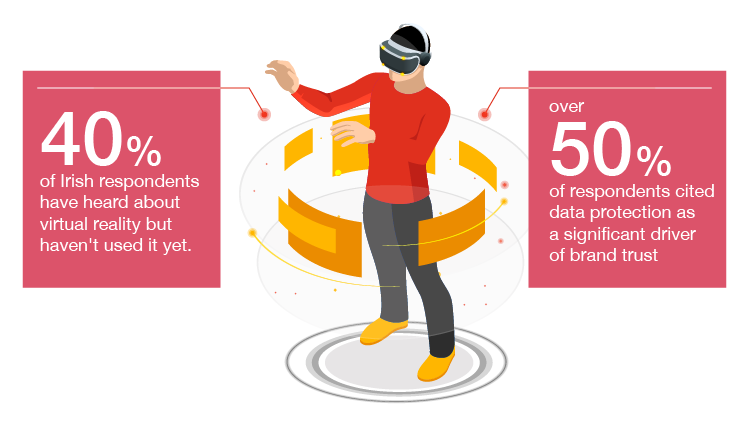Where will consumers spend?
46% of consumers are expected to increase purchasing from local retailers, with 68% willing to pay more for products produced or sourced domestically in order to support the local economy. The top three categories in which Irish consumers expect to increase their spending are groceries, travel and eating out—significantly higher than their global counterparts—and over 40% expect to increase purchasing across both online and in-store channels. The rising price of groceries and product availability are the two key issues facing consumers purchasing on both channels. These issues have resulted in consumers frequently shopping with multiple retailers and using comparison sites to assess availability.
Which of these issues is having the greatest impact on you when shopping?
(Showing answers only from respondents answering 'occasionally';, 'frequently' or 'almost always')
In a physical store
(% rank 1-3)
Rising prices for groceries
Unable to purchase a product due to it being out of stock
A product taking longer to be delivered than you were told at time of purchase
While shopping online
(% rank 1-3)
Rising prices for groceries
Unable to purchase a product due to it being out of stock
A product taking longer to be delivered than you were told at time of purchase
| Global | Australia | Brazil | Canada | China | Egypt | France | Germany | Hong Kong, SAR | India | Indonesia | Ireland | Japan | Malaysia | Mexico | Philippines | Qatar | Saudi Arabia | Singapore | South Africa | South Korea | Spain | Thailand | United Arab Emirates | United States | Vietnam | |
|---|---|---|---|---|---|---|---|---|---|---|---|---|---|---|---|---|---|---|---|---|---|---|---|---|---|---|
| Rising prices for groceries | 65%,56% | 60%,44% | 71%,67% | 76%,59% | 43%,41% | 67%,60% | 61%,54% | 68%,58% | 59%,52% | 52%,51% | 56%,47% | 75%,56% | 76%,62% | 67%,60% | 65%,56% | 68%,55% | 54%,59% | 58%,54% | 57%,57% | 76%,62% | 65%,64% | 69%,57% | 57%,54% | 48%,48% | 73%,60% | 66%,59% |
| Unable to purchase a product due to it being out of stock | 37%,43% | 55%,52% | 25%,30% | 46%,47% | 26%,35% | 24%,35% | 34%,47% | 40%,40% | 49%,49% | 31%,44% | 41%,44% | 46%,51% | 44%,50% | 42%,44% | 30%,39% | 29%,38% | 35%,39% | 30%,38% | 36%,47% | 35%,51% | 30%,39% | 34%,35% | 33%,34% | 29%,38% | 56%,58% | 38%,31% |
| A product taking longer to be delivered than you were told at time of purchase | 20%,42% | 18%,49% | 22%,44% | 16%,44% | 30%,46% | 22%,43% | 25%,40% | 15%,38% | 20%,44% | 24%,39% | 20%,44% | 16%,45% | 15%,31% | 19%,45% | 16%,41% | 21%,51% | 23%,44% | 28%,41% | 17%,41% | 15%,38% | 28%,44% | 16%,39% | 24%,42% | 25%,43% | 20%,40% | 24%,48% |










